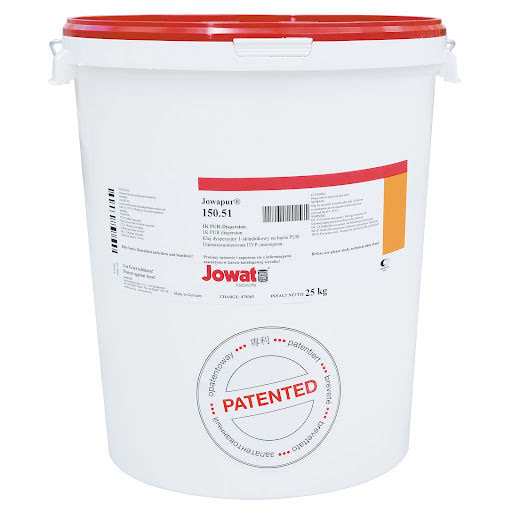JOWAPUR 150.51 - Adeziv în dispersie PU

Vă rugăm să vă autentificați sau să vă înregistrați pentru a vedea prețurile produselor.
| Ambalare | |||||
|---|---|---|---|---|---|

|
25 kg | ||||
Descriere produs
Singlecomponent dispersion polyurethane adhesives without the addition of hardener. It is suitable for thermoplastic films on heated presses and allow excellent processing on automatic spray equipment.
Usage:
- thermoplastic foil
- automatic spray equipment
Characteristics:
Dispersion polyurethane adhesive Jowapur 150.51 in white color have a built-in crosslinking mechanism. This adhesive is characterized by excellent film formation, high initial strength, good water and heat resistance.
This homogenous adhesive guarantee equally bonding with good results. It is not necessary to add a hardener.
Viscozity (Brookfield) | approx. 3,000 | mPas |
Solids | approx. 40 | % |
Density | approx. 1.06 | g/cm3 |
pH | approx. 8.0 |
|
Application:
We recommend doing preliminary customer testing to determine optimum processing parameters. All parts of materials coming into contact the glue should be made of V2A steel or of inert plastics like teflon, PP, polyamide. Avoid contact of the adhesive with iron and coloured metals like zinc, brass, copper, aluminum and others.
The minimum temperature of the adhesive, air in the environment and the bonded materials is 15 °C, not identical to the MFT, i.e. when the adhesive begins to stick. Avoid inhalation of spray mist when spraying.
Heat resistance values are highest if the lamination is carried out within 8 hours after adhesive application and an activation temperature in the bondline > 60 °C.
After use machines and equipment can be cleaned with cold or warm water with Hraniclean 07.
For detailed information see the Technical and Safety Data Sheet.
Packaging and storage:
Store in the original packaging in a dry and cold place for a period indicated on the label at temperatures of +15 to +25 °C. During transport the temperatures may be lower, from +6 to +14 °C, but the material may be exposed to these temperatures for a max. duration of 14 days. Cold material may not be processed, but must be previously warmed up slowly, about 2 to 3 days depending on the size of the package.
Open packs can be further processed.